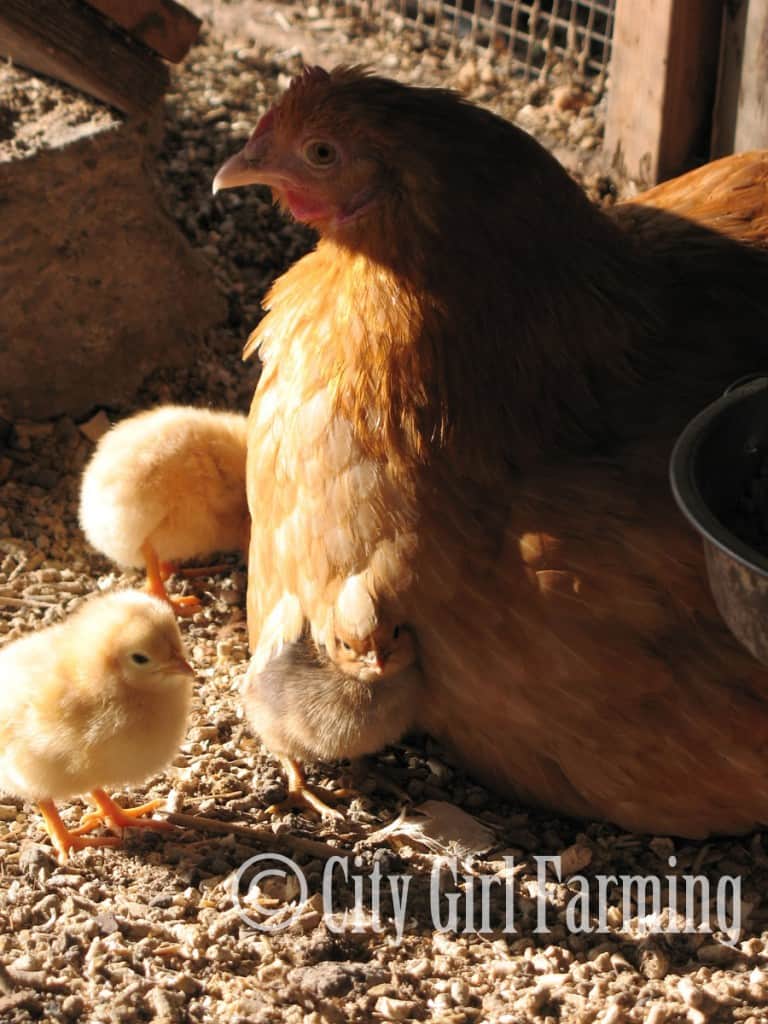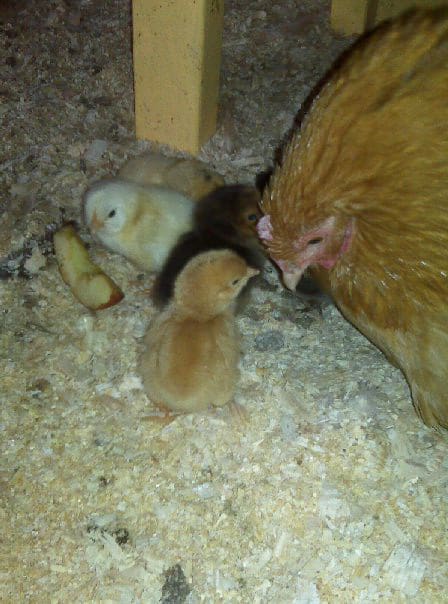 Chickens hatching eggs? Yes! You don’t need any fancy incubation equipment if you’ve got a broody hen…you just need some fertilized eggs if you’d like to have your chickens hatching eggs. If you’ve never watched a mother hen with her chicks, you’re in for some amazing, wonderful surprises. It’s a great experience. And here’s how to make it happen…
Chickens hatching eggs? Yes! You don’t need any fancy incubation equipment if you’ve got a broody hen…you just need some fertilized eggs if you’d like to have your chickens hatching eggs. If you’ve never watched a mother hen with her chicks, you’re in for some amazing, wonderful surprises. It’s a great experience. And here’s how to make it happen…
Broody Hens
First, you start with a broody hen. Essentially, a hen ‘goes broody’ when she her body temperature rises and she is overcome with the urge to gather eggs and sit on them in a nest (her eggs as well as eggs from any other hens). Once she makes up her mind that she’s going to hatch a clutch of eggs, it’s hard to change her mind. She will sit on the nest of eggs faithfully, waiting for them to hatch. (Read more about Broody Hens here.)
The problem is, unless you have a rooster in your flock, those eggs are never going to hatch. Ever.
Because broodiness is costly to production farms (if a hen is broody, she won’t lay eggs until awhile after her chicks hatch, so she’s out of the production mode a couple of months), broody characteristics have been breed out of many breeds of chickens. If you are hoping to hatch some eggs with one of your hens, choose from breeds that have a tendency for going broody.
Fertilized Eggs
So, if you’ve got yourself a broody hen, great! Now you just need some fertilized eggs. If you don’t know anyone who has a flock of chickens with a rooster, try places like local feed stores or Craigslist for leads. You can also buy them online, but they’re SUPER expensive and run the risk of getting a bit scrambled on the way to you. A local source is a better option, if you can find them.
The sooner you give your broody hen fertilized eggs, the better. Her hormones are primed and ready to go. Let nature run its course with her. Once, of course, you have eggs that will actually hatch. As for the amount of eggs you should give your hen, a rough guideline up to six for a smaller breed and up to 12 for a larger breed. The number is actually dependent on how many eggs your hen can successfully keep warm by covering them with her body.
Once you have the fertilized eggs, you’ll need to replace the eggs she’s been sitting on with eggs that have the hope of hatching. It’s best to do this at night (hens are calmer and they can’t see in the dark) because Mama will be protective over her eggs and won’t want you to take them. (You can also place other kinds of fertilized eggs under her as well such as other breeds of chickens, ducks, quail, etc. My mom tells a story of a Bantam hen she had that hatched out turkey eggs, so pretty much anything is possible.)
If you have the space, it’s best to put Mama and her clutch of eggs in a space to themselves. I have a small ‘nursery’ coop (converted dog house) where they can live separate from the rest of the flock. This will keep Mama safe from getting picked on from other hens in the flock as well as protecting the eggs from being broken by the other hens. If she’s established where she is and she’s out of the way, you can leave her and see how it goes. If she’s in a precarious place, try moving her and her nest at night.
Taking Care of Mama
A hen who is busy trying to hatch a clutch of eggs will rarely leave her nest. During this time, make sure there’s food and water nearby for her to eat and drink. She won’t eat as much as usual, but that’s because she’s not moving around much. (Since she’s not laying eggs at this time, she also doesn’t need layer feed. Switch her to chick starter and you’ll already have the right food out for the chicks when they hatch.)
Also, watch to make sure the other chickens aren’t picking on her (if you haven’t already separated her out from the rest of the flock).

When the Babies Arrive
After 21 days, the eggs will begin to hatch. Although most eggs hatch at 21 days, there is a 36-hour window for hatching. During hatching time, don’t disturb the process. If all the eggs haven’t hatched at the same time, wait a day or two longer and then remove all the unhatched eggs. If some of the eggs hatch earlier, the hen might abandon the unhatched eggs to care for the chicks she’s already got.
Once the chicks are born, make sure to keep chick starter feed and small water containers near the nest (if you haven’t already done this). The new mama will take it from there. She will teach her chicks where and how to eat, keep them warm, and protect them, even to the cost of her own life.
If you want to separate the hen from her chicks, you can do that at any time. However, it’s best to wait until they’re 4-6 weeks old and fully feathered out. If you remove the chicks before then, they’ll need to be put in a brooder with a heat lamp until they can keep warm themselves (after they’re fully covered with feathers).
Pros and Cons of Hens Hatching Chicks
The pros of using a broody hen to hatch chicks is that they do it best. It’s the way nature intended it. And (generally), most breeds of chickens that tend to go broody also make good mothers. And if you have a broody hen to begin with, it’s a good way to get her over it–just let her do what nature is telling her she wants to do: Raise babies.
Having a chicken raise her own chicks is a good way to add to your flock without the issues of introducing new chickens to the ones you already have, which can often be stressful on both new chickens as well as chicken owners.
It’s also a great learning experience for all involved. How cool is it to participate in the life cycle of going from eggs to chicks to chickens? Not only that, but from egg to chick is only 21 days, so you don’t even have to wait very long for the experience.
One of the cons to letting nature take over, is that you’ve got a 50/50 chance of getting a roosters. For those of you raising chickens in the city, this might be an issue, as often roosters aren’t allowed. (The last batch I hatched out consisted of nine eggs. Seven of them hatched and 4 of those were roos!)
Also, there’s a chance that not all your eggs will hatch (so if you’re aiming for a certain number of new chicks, you might not get them).
Additionally, if you’re getting eggs from a local farm, you’re less likely to be able to choose exactly the kinds of chicks you’ll be hatching.
Another slight con for city folks is that most small backyard flocks are tame, especially those chickens who were obtained as chicks and raised by hand. When baby chicks are raised and nurtured by humans, they get accustomed to being handled. However, a hen will do her best to keep you away from her chicks, so hen-raised chicks aren’t nearly as tame as their human-raised counterparts.
All in all, though, I’d encourage you to allow your broody hen to sit on some eggs at least once, just for the experience of it. I don’t think you’ll be disappointed. I LOVE the whole process.